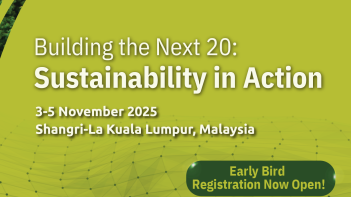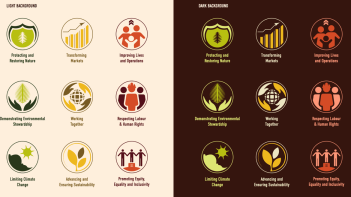Each morning, Mahjor Rabbi prepared for a labour-intensive day. His work-weary body is a tell-tale sign of a tough life in the logging industry. The physical exertion required to cut trees was extremely taxing for Mahjor. For his hard labour, he went home with the meagre sum of RM135/month (approx. USD30/month). If he put in extra time at the mill, he could make RM300.
Life changing transition to smallholder farming
“My previous job made me feel guilty as I knew I was contributing to deforestation and climate change” said Mahjor. It was then he made a decision that would not only improve his life, but make him an integral part of his local economy. Mahjor owned 3 acres of land and decided to start oil palm farming on his own in 2011. The decision proved beneficial for Mahjor, especially as the land he owned did not contain any primary forest nor High-Conservation Value forest. Within a matter of months, Mahjor got permission to plant and eventually became a RSPO-certified palm farmer.
Smallholders are critical to palm oil production
Though technically called smallholders, people like Mahjor make up nearly 40% of global palm oil production, playing a pivotal role in the industry’s success. In the RSPO definition, smallholders own plantations that are smaller than 50 hectars. They contribute to 8.4% of the total volume of RSPO-certified sustainable palm oil.
Growing industry changes lives and economic landscape
Demand for palm oil is steadily increasing and it is central to the nations where it is grown. The cascade effect of this industry is not just apparent in the growth of the economy of the source country but it can also be seen through the long-lasting impact that it leaves on the lives of smallholder and their families.
In Mahjor’s case, it took him 3 to 4 years to prepare the land, plant and then watch his effort pay off. He used his savings, worth RM5000, to clear his land. Upon receiving seedlings from the Malaysian Palm Oil Board, Mahjor began to plant on his own.
Collaboration allows opportunity for improvement
He joined the Wild Asia Group Scheme (WAGS) and became a certified smallholder in December 2015. WAGS is a social enterprise that enhances traceability and sustainability of palm oil for smallholders while teaching valuable techniques that for improving productivity and marketability.
For instance, Mahjor was taught about the correct and efficient application of fertilisers to yield healthier crops. He also learned the importance keeping his plots tidy as an indication of good farm management.
Life after smallholder certification
Mahjor is now in the best financial position of his life. His farm, combined with his sister’s 4-acre plot, yields about 2 tonnes of produce a month. He easily earns slightly over RM1,000 monthly. Comparatively, Mahjor earns more than the average skilled labourer.
Today, Mahjor says he is happier, healthier and independent. He travels to attend training programmes and continues to seek improvement. Mahjor hopes that one day his children will continue his legacy.
Keep reading
Indonesia National Interpretation Public Consultation: 8 August 2025 – 7 October 2025
Indonesia National Interpretation Public Consultation: 8 August 2025 – 7 October 2025
Call for Expression of Interest: Guatemala National Interpretation Task Force for 2024 RSPO Principles and Criteria (RSPO P&C)
Call for Consultants: Independent Evaluator for Compensation Plans and Reviewer for Drainability Assessment Reports

Announcement on 22nd General Assembly (GA22) of RSPO Members
Extension of Licence Validity and Carry-Over Credits Mechanism for Certified Independent Smallholder (ISH) Groups

RT2025 Early Bird Registration Now Open!




